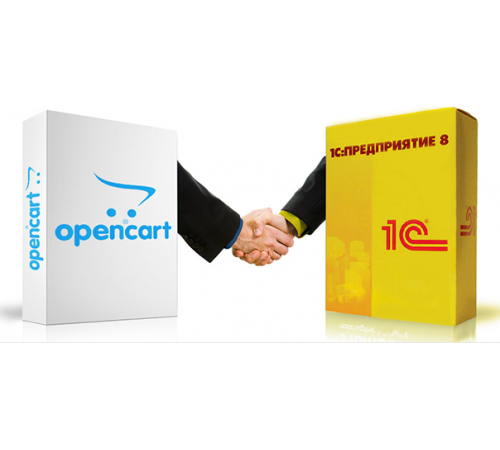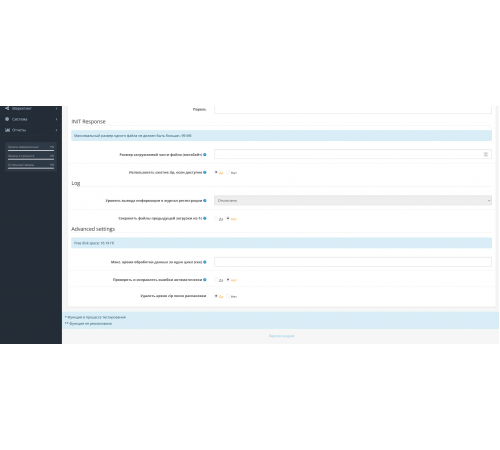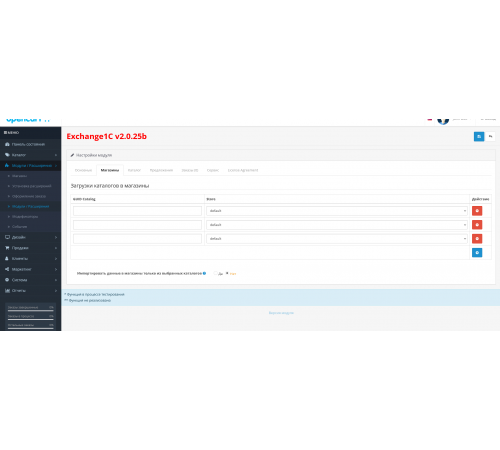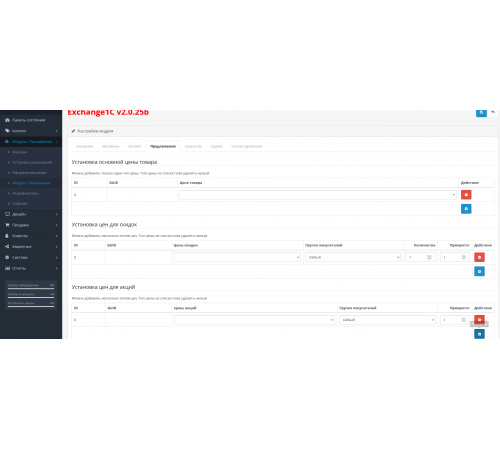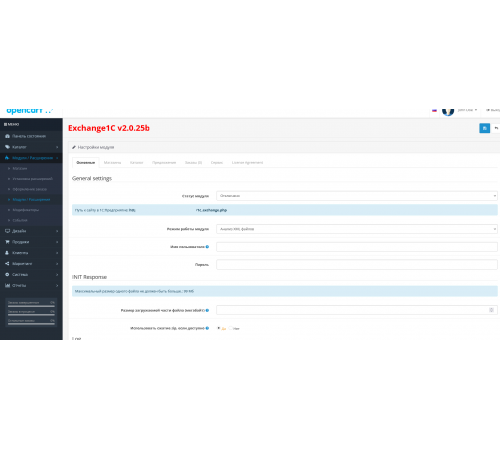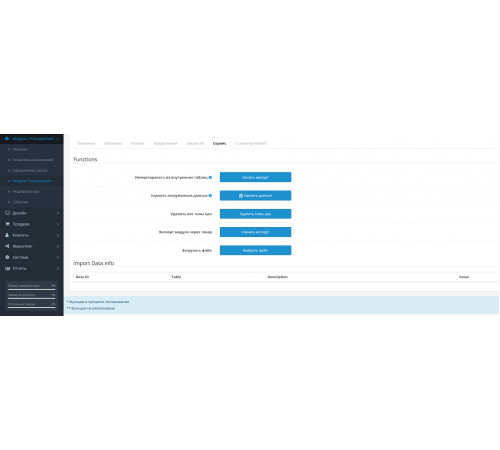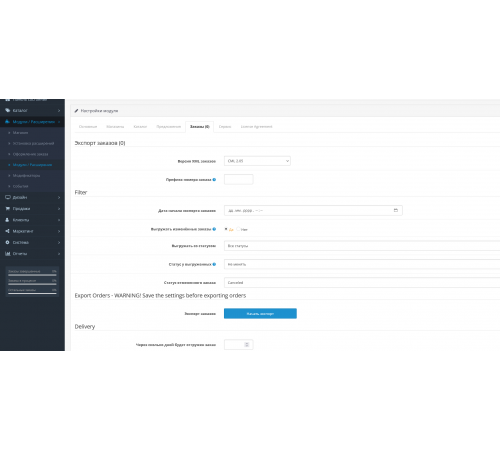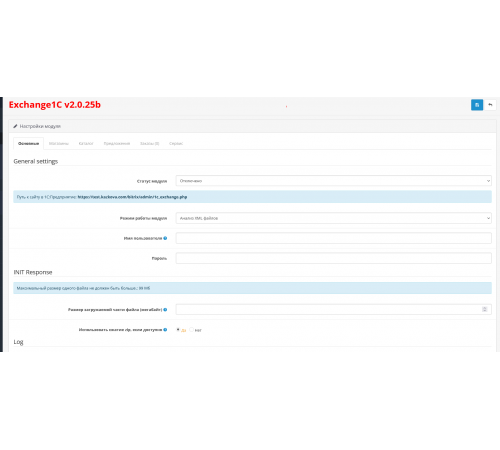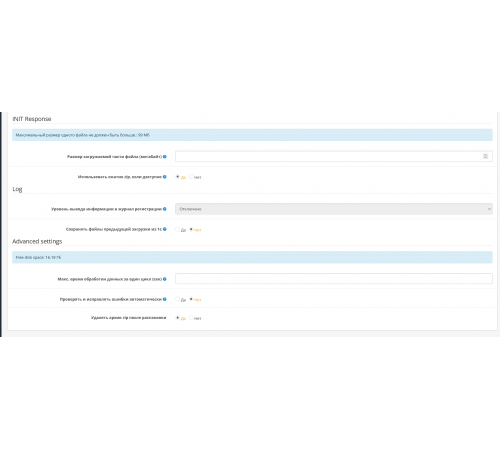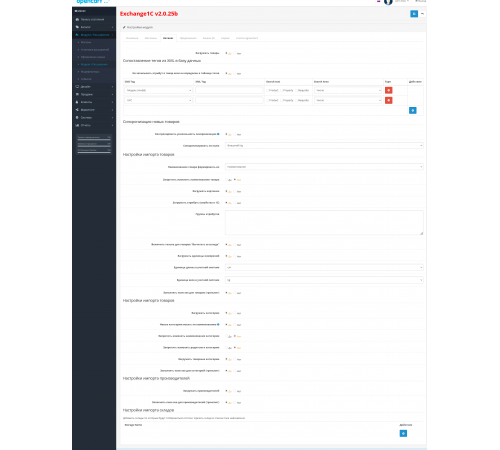Якщо потрібен обмін між Вашим сайтом та 1С:Підприємство (далі 1С) , яке використовує штатну функцію обміну на основі CommerceML, то це те, що Ви шукаєте.
Принцип обміну такий, 1С звертається до сайту, а сайт відповідає на запити, сам сайт не підключається до 1С. Це досить старий алгоритм роботи з сайтом, але найпоширеніший, тому що не потребує додаткових доробок.
Основні можливості модуля:
- Вивантаження товарів на сайт
- Можливість вимкнути оновлення (картинок, категорій, властивостей (атрибутів) та ін.)
- Вивантаження товарних категорій чи груп на сайт
- Вивантаження властивостей товарних категорій (у майбутньому їх можна використовувати у фільтрі)
- Вивантаження властивостей товарів в атрибути на сайт
- Встановити одиниці довжини та ваги, які вивантажуються з 1С
- Типи цін вибираються зі списку, який завантажується при першому обміні
- Можливо вказати конкретні склади за якими вважатимуться залишки
- Можливо вимкнути завантаження пропозицій, характеристик
- Можливо відключити завантажені товари без цін та/або без картинок
- Вивантаження замовлень із певним одним статусом починаючи з певної дати
- Можливе вивантаження резерву товарів у замовленні
- Конвертація файлу замовлень (XML) у кодування Windows-1251 для старих конфігурацій.
- Якщо 1С встановлено модуль обміну з Бітрікс, то додатково перевіряється номер версії.
- Двосторонній обмін замовленнями
- Обмін статусами замовлень
- Можливо проводити обмін двома етапами, спочатку завантажуємо XML в базу, а потім з адмінки зробити імпорт останніх завантажених даних.
- Видалити товари, категорії, атрибути, опції, які були завантажені з 1С
- Ручне завантаження даних XML чи ZIP архівів.
Модуль версії 2.0 довелося писати з нуля тому, що потрібно було організувати підтримку сесій. У сесіях зберігаються дані авторизації, інформація про файл та завантажені дані.
Тим самим ми можемо тепер завантажувати дані порціями, якщо модуль не вкладається за часом, то він зупинятиме завантаження і повідомлятиме 1С про те, що імпорт ще не завершений, тоді 1С відправляє повторно запит на імпорт файлу і модуль продовжує завантажувати дані.
Також важливою зміною стало завантаження даних, тепер дані не завантажуються безпосередньо в CMS а спочатку в спеціальні таблиці, а потім з цих таблиць в CMS. Ця схема була включена для додаткових обробок, наприклад, для завантаження опцій, одним запитом модуль бачить скільки опцій і зручно аналізувати ціни та залишки.
Модуль має 8 розділів:
- Основні
- Магазини
- Каталог
- Пропозиції
- Замовлення
- Сервісні
- Ліцензійна угода
- Оновлення
Пункт оновлення буде відображатися якщо ви оновили файли модуля і необхідно буде провести оновлення таких як таблиці.
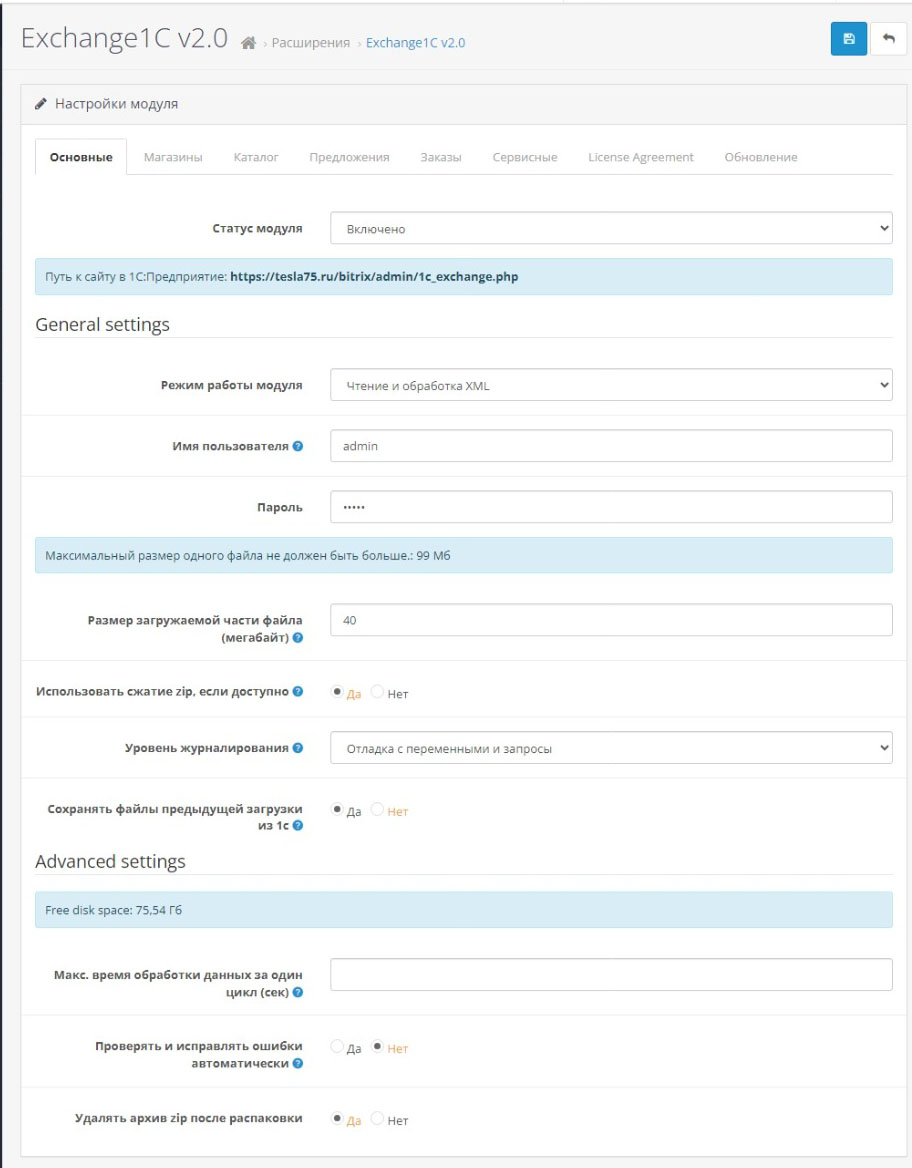
Основний розділ
Статус модуля – якщо вимкнено, то модуль 1С відповідатиме failed
Шлях до сайту який прописується в 1С https://ВАШ_САЙТ/bitrix/admin/1c_exchange.php , він відрізняється від того, що був у версії 1.6, але тепер, коли налаштовуєте обмін в 1С, вказуєте що обмін буде з Бітрікс. До речі, папка bitrix після встановлення модуля не створюється, її необхідно створити вручну і закачати туди файл 1c_exchange.php. Це обмеження встановлює Opencart.
Режим роботи модуля - тут два варіанти, перше читання, а друге читання та обробка:
- Виконується читання файлів XML, запис у таблиці модуля.
- Виконується читання файлів XML, запис у таблиці модуля.
- Імпорт у CMS даних із таблиць модуля
Ім'я користувача та пароль - для авторизації 1С, вводиться в налаштуваннях обміну 1С. Якщо не вказати логін, то авторизація проходитиме з будь-яким логіном. Пароль забивається зірочками, якщо він встановлений. Пароль не можна переглянути через код сторінки.
Розмір завантажуваної частини файлу - необхідно встановити трохи менше розміру максимального дозволеного на сайті, розмір встановлюється в мегабайтах. Цей розмір модуль повідомляє 1С file_limit = XX (в байтах) при виконанні запиту mode = init у другому рядку.
Використовувати стискування zip — цей пункт може бути заблокований, якщо Ваш хостинг не підтримує архіви zip. Модуль повідомляє цей параметр 1С zip=yes|no при виконанні запиту mode=init у першому рядку
Рівень виведення інформації в журнал реєстрації — вказується, наскільки детально буде здійснюватися запис у журнал під час обміну, використовуйте налагодження зі змінними та запити лише під час налагодження. Режим налагодження також можна увімкнути примусово у файлі /controller/extension/module/exchange1c.php на початку файлу define('DEBUG',1);. Цей параметр завжди включений до бета-версії. Коли налагодження буде увімкнено примусово, то параметр буде заблоковано. Рівень з налагодженням включає в лог інформацію про номер рядка і в якому файлі

Зберігати файли попереднього завантаження з 1С - якщо включено, то перед початком обміну модуль перевірить наявність каталогу 1c_catalog з даними попереднього обміну, якщо такий існує то перейменує його, в кінці імені додає цифру по порядку 1c_catalog1, 1c_catalog2 і так далі, кількість не обмежена, лише за вільним місцем на диску.
Макс. час обробки даних за цикл (сек) — це експериментальна функція, необхідна налагодження. Зменшуючи час ми обмежуємо кількість даних, що обробляються, і модуль завершує цикл повідомивши 1С що обмін в процесі (progress). Також час обробки обмежений параметрами php у провайдера.
Перевіряти та виправляти помилки автоматично — Експериментальна функція, яка перевіряє дані після виклику деяких функцій, рекомендується увімкнути, якщо виникнуть помилки ERROR 500. Якщо помилка не піде, то звернутися до розробника.
Видаляти архів zip після розпакування — Якщо обмін відбувається архівами, то після завантаження та розпакування даних архів не буде видалений і залишиться в каталозі 1c_catalog
Магазини
Тут можна налаштувати завантаження кількох каталогів у різні магазини CMS. Для цього потрібно вказати Ід каталогу з 1С і в який магазин вантажити.
Якщо включена галочка Імпортувати дані в магазини тільки з вибраних каталогів, тоді за відсутності у файлі вказаного каталогу, дані не будуть завантажені.
При відключеній галочці всі каталоги не вказані в таблиці завантажуватимуться в основний магазин.
Каталог
Завантажувати товари — Модуль імпортуватиме товари до каталогу CMS
Завантажувати категорії — 1С вивантажує групи або товарні категорії, які будуть завантажені в CMS. Також будуть прив'язані товари. Якщо не включати, то завантажені товари не будуть прив'язані до жодної категорії.
Нові категорії шукати за найменуванням — При завантаженні категорій модуль шукатиме існуючі категорії по Ід і у разі відсутності продовжить пошук за найменуванням. Модуль двічі не використовуватиме категорію з однаковим найменуванням, але якщо на сайті і в 1С є дві по дві однакові категорії, тоді може бути таке, що модуль прив'яже не в тій послідовності. Тоді потрібне буде ручне коригування Ід.
Вимкнути порожні категорії — Після завершення завантаження каталогу модуль запустить сканування категорій у CMS з підрахунком кількості в них включених товарів, якщо в якійсь категорії всі товари будуть вимкнені або взагалі не буде товарів, то категорія відключається, але не видаляється. Функція виконується в одному циклі завантаження даних, в подальших версіях буде включена в окремий цикл. Ця функція підвищує час обміну.
Завантажувати товарні категорії — 1С вивантажує товарні категорії та властивості до них, надалі модуль використовуватиме їх для побудови фільтру товарів.
Завантажувати виробників — Виробники будуть завантажені з картки товару з тегом <Виробник>, <Виробник> або вказаний Вами тег, наприклад Бренд. Пошук тегів здійснюється у властивостях товару.
УВАГА! На момент написання у версії 2.0.12 ця опція не відключається, тобто вона постійно увімкнена і не відключає завантаження виробників!
Завантажувати картинки — При імпорті даних замінює картинки на завантажені з 1С, якщо вимкнути, тоді існуючі картинки залишаться без змін, а нові не будуть завантажені. Цей варіант потрібен, якщо картинки завантажуються вручну через адмінку сайту.
Перевіряти картинки на диску під час імпорту товарів — За відсутності картинки модуль видалятиме і посилання на неї. Але якщо Ви завантажуєте картинки після обміну вручну, то рекомендую відключити цю функцію.
Відключати товари без картинки — Якщо товар не матиме основної картинки, тобто навіть однієї картинки, то такий товар буде відключений, при появі картинки буде включений.
Завантажувати атрибути — З 1С вивантажуються властивості та завантажуються в атрибути. При відключенні завантаження також не будуть завантажені і виробники з властивостей. Якщо потрібно буде все ж таки завантажувати виробників з властивостей але не завантажувати атрибути, напишіть мені я подумаю як це продати.
УВАГА! Властивості, що починаються з символу «!» будуть ігноровані та не будуть завантажені в атрибути.
Завантажувати властивості товарів — Насправді це звучить як попередня функція, але ця функція відключає завантаження навіть у тимчасові таблиці, коли попередня лише імпорт у CMS із тимчасових, тобто при відключенні цієї функції вже не будуть завантажені атрибути, виробники із властивостей.
Найменування властивості Виробника — У цьому полі потрібно вказати назву тегу властивості, в якій у вас передається виробник.
Завантажувати склади — Якщо увімкнено, будуть завантажені склади і можна буде вважати загальні залишки за вибраними складами.
Завантажувати одиниці вимірів — У таблиці модуля будуть завантажені одиниці вимірів для подальшої обробки, наприклад, для перерахунку довжин, ваги.
Одиниця довжини в обліковій системі — Якщо в CMS буде відрізнятися одиниця вимірювання, що завантажується, наприклад, з 1С в см а CMS мм, то модуль перерахує в мм.
Одиниця ваги в обліковій системі - Те ж саме з вагою, якщо в 1С в кг, а в CMS грами, то модуль перерахує значення ваги.
Пропозиції
Тут можна встановити тип ціни основну для товару, для знижки та акції. Основний тип ціни можна задати лише один, а для знижок та акцій багато.
Наприклад, можна поставити основну ціну, і знижку для групи покупця основної та кількості 3, тоді на сайті буде відображатися додаткова ціна від 3-х штук і більше. Або знижку можна надати для іншої групи покупців,
Склади — можна вказати які склади враховуватимуться у залишках та списку.
Завантажувати пропозиції — глобальне налаштування можна вимкнути завантаження і цін і залишків.
Завантажувати параметри - в 1С якщо є параметри, то вони будуть завантажені в налаштування без поділу за якостями. Значення опції будуть як в 1С назва характеристики а найменування опції буде жорстко задана Варіанти SKU де SKU це значення поля товару. Загалом тут можна налаштувати по-різному, напишіть хто як вважає за потрібне.
ВАЖЛИВО! На момент написання статті у версії 2.0.12 ця опція не вимикається, тобто. вона завжди включена.
Опції товару — Якщо залишок опції дорівнює нулю, тоді така опція не буде додана до списку. При вимкненій, всі опції будуть у списку. Але якщо всі значення опції будуть відсутні, то цей товар неможливо буде покласти в кошик. Це стосується товарів на замовлення, цей варіант не розглядався. Якщо буде потрібно, то напишіть мені.
Варіант вибору опції – у якому вигляді відображати опції на сайті. У опції завантажується перша картинка з характеристик і вона відображається як перемикач.
Завантажити ціни — Якщо вимкнути, то старі ціни залишаться незайманими, а нові не будуть завантажені.
Завантажити залишки — Якщо вимкнути, старі залишки залишаться, а нові не будуть завантажені.
Статус за наявності товару - Наприклад, статус "в наявності" або на "віддаленому складі".
Статус за відсутності товару — Наприклад, товар у постачальника на складі в одному місті, статус «на замовлення 1 день» або «ні», статуси можете ставити будь-які
Відключати товари без ціни — Якщо товар не матиме основної ціни, такий товар буде відключений, а при появі ціни буде назад включений.
При імпорті опцій пропускати id знайдені у попередніх обмінах. Налаштування дозволяє виправити помилки SQL INSERT Dublicate Key, що виникли при завантаженні товарів з 1С з характеристиками - це експериментальна функція, яка обнуляє зв'язки Ід-id у пропозицій, характеристик і опцій і заново їх будує, при цьому існуючі CMS у товару також видаляються.
Замовлення
Дата початку експорту замовлень – вивантаження замовлень у 1С розпочнеться лише з цієї дати, це необхідно, щоб не вивантажувати старі замовлення. Ця дата автоматично змінюється після кожного вдалого вивантаження замовлень, щоб повторно не вивантажувати одні й самі замовлення в 1С.
Вивантажувати зі статусом — Замовлення вивантажуються в цій версії лише з певним статусом.
Вивантажувати оплачені – ідея вивантажувати І оплачені!
Вивантажувати відвантажені – ідея вивантажувати І відвантажені!
Експорт замовлень - кнопка вивантажує у файл замовлення, можна подивитися які замовлення будуть вивантажені в 1С
Зберігати експортований файл замовлень на диск — при експорті замовлень вручну або через 1С зберігатиметься файл на диску в каталозі 1c_catalog.
Назва папки на диску /storage/cache/ — тимчасове рішення для зберігання тимчасових файлів під час обміну
Резервувати товари — якщо включено, то в табличній частині замовлення, що вивантажується, буде додано колонка «Резерв» і кількість дорівнює кількості товару в замовленні. Якщо 1С підтримує резервування замовлень, то товар під час проведення документа в 1С потрапляє у резерв.
Конвертує дані в кодування CP1251 - ця опція при обміні зі старими системами 1С на звичайних формах, на керованих формах не потрібно включати.
Сервісні
Скинути налаштування — стирає всі налаштування модуля та виставляє за промовчанням. Значення за замовчуванням у опціях виділені червоним кольором, після натискання цієї кнопки необхідно оновити сторінку модуля.
Завантажити імпортовані дані — ручний імпорт даних із останнього обміну. Після обміну завантажені дані із 1С залишаються у спеціальних таблицях модуля. Ця кнопка була залишена для налагодження, наприклад, якщо режим модуля встановити "Тільки читання XML" і перевірити чи немає помилок, а потім цією кнопкою імпорт в CMS і якщо щось не вдасться виправити помилки в модулі і повторити імпорт вже без 1С.
Видалити завантажені дані - видаляє товари, категорії, опції, атрибути тільки ті, що були завантажені через модуль. Але якщо Ви відключите і увімкніть модуль, всі зв'язки зітруться і видалити дані автоматично вже не вийде.
Експорт модуля через товар – це службова кнопка
Завантажити файл — Ви можете завантажити архів або окремі файли XML для обробки. Завантаження окремих зображень не підтримується поки що, але можна реалізувати якщо запропонуєте як.
Розділ Основні Статус модуля включає або вимикає модуль. При статусі вимкнено у списку модулів також відображатиме статус вимкнено і модуль не оброблятиме з'єднання.
Для налаштування облікової програми (УП) з сайтом модуль формує рядок, шлях до сайту, скопіюйте її і вставте в налаштування обміну УП. Також введіть логін та пароль, який буде використовувати Ваше УП для підключення до сайту.
Режим роботи — модуль спочатку читає XML, записує до бази, а потім починає з бази обробляти дані та вносити до таблиць сайту. Ви скажете, що це навантажує сервер і повільніше йде обмін. Можливо, але є дані обробки яких вимагає показати всі пропозиції товару, а при послідовному читанні це зробити складніше, а раптом пропозиції товару в XML будуть розкидані по файлу?
Скоро з'явиться спеціальний режим, де модуль читає весь файл, аналізує та формує рекомендації щодо налаштування хостингу. Ця опція з'явиться у версії 2.0.23b. Тепер при першому обміні ставимо режим читання XML. Модуль успішно завантажить необхідні довідники для налаштування модуля, далі налаштовуємо ціни та склади та переводимо в режим «Читання та обробка XML».
Ім'я користувача та пароль - це доступ для УП через інтернет, не плутаємо з входом до адмінки

INIT Response - розділ, що відповідає за ініціалізацію. Ініціалізація проходить після авторизації, УП запитує сайту який максимальний розмір файлу може обробити модуль і чи запаковувати всі файли в архів.
Розмір завантажуваної частини файлу - коли розмір файлу обміну перевищує вказаний, то УП розріже файл на вказаний розмір і посилатиме частини файлу, а модуль їх з'єднуватиме. Після успішної «склейки» частин модуль почне обробляти файл. В основному це стосується лише архівів, тобто коли включено використання стиснення.
При включеній опції використовувати стиск zip, УП запакує всі файли в архів і завантажить на сайт. Завантажити один файл набагато швидше ніж 5000 дрібних, тому рекомендую вмикати, архів на сервері розпаковується швидко від 1 до декількох секунд.

Ведення журналу є важливим моментом у пошуку помилок, але якщо обмін проходить без помилок немає, залишаємо висновок лише помилок і іноді поглядаємо в цей журнал.
Поки модуль режимі розробки, beta версія, то налагодження включена постійно, і журнал не можна переключити налаштуваннями, т.к. опцію заблоковано. Але якщо потрібно розблокувати, тоді у файлі контролера змініть константу define('DEBUG',1) на define('DEBUG',0). У режимі налагодження файл пишеться багато налагоджувальної інформації, розмір файлу швидко збільшується від обсягу завантажених даних.

Додаткові налаштування потрібні переважно для пошуку помилок, їх краще залишити за замовчуванням.
Максимальний час обробки задає час у секундах, після якого модуль завершує обмін і передає відповідь progress. УП після такої відповіді повторює запит на обробку файлу, і так, поки модуль не відповість success або failure. Не рекомендується ставити дуже короткий час, інакше модуль буде нескінченно обробляти файл.
Перевіряти та виправляти помилки автоматично модуль може не всі, а лише ті, що виникли в базі після переривання обміну з помилкою. Якщо помилка у модулі, то така помилка не виправиться. При включеній опції модуль повільніше робить обмін.
Після завантаження архіву модуль його одразу розпакує, і при включеній опції видаляти архів zip модуль видалить архів. Якщо виникає помилка розпакування або завантаження даних на сервер, то краще відключити цю опцію і подивитися, чи правильно завантажується архів, чи не обрізається він і чи взагалі завантажується.

Якийсь час у налаштуваннях будуть присутні англійські слова, поки модуль налаштовується та розробляється, пізніше все буде перенесено до мовного файлу.
Розділ Магазини Налаштувати можна для завантаження певного каталогу в існуючий магазин на сайті. Опція працює, але на практиці я не застосовував кілька магазинів, хоча пробував налаштувати, але мені не вдалося. Якщо комусь нагоді напишіть мені, дуже цікаво як буде працювати в CMS мультимагазин.
При включенні галочки імпортувати тільки з вибраних каталогів модуль не буде вантажити інші каталоги. Якщо галочка відключена, модуль буде вантажити будь-які каталоги в основний магазин а при збігу Ід з налаштованим в таблиці - в зазначений магазин.

Розділ Каталог Каталог - це основний файл для завантаження даних, якщо каталог не завантажився, то й пропозиції не будуть завантажені. Ім'я каталогу зазвичай називається import.xml, він може складатися з декількох частин і кожна частина може називатися import0.xml або import0_1.xml
Проте існують різні моменти, при яких завантаження каталогу не потрібне, наприклад, перший раз розвантажили каталог, а потім потрібно тільки оновлювати залишки і ціна, а нові товар не додавати і не змінювати існуючі. Тоді можна вимкнути опцію Завантажувати товари.
Нова опція з'явилася у версії 2.0.23 це зіставлення тегів, раніше в 1.6 версії там було текстове поле, а зараз зручніша таблична частина, яка мінімізує помилки користувача, при неправильному вказівці тега, система його просто пропустить. Але щоб дізнатися чи пропустила вона його чи ні, можна буде тільки у версії 2.0.24 з увімкненим режимом роботи, аналіз файлів обміну. Після аналізу модуль підсвітить червоним рядки, які не спрацювали.
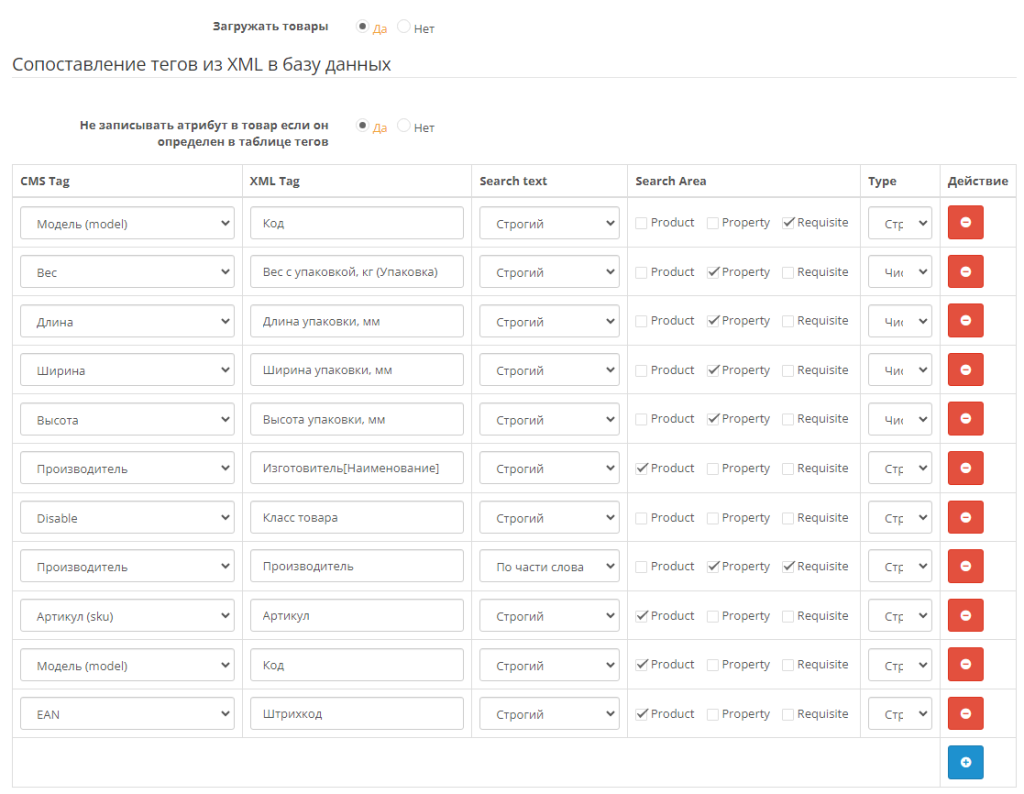
Докладніше опишу як працює кожен рядок у прикладі. Модуль починає пошук зверху вниз, як тільки з'являється збіг записується значення в задане поле. Якщо задати кілька разів запис у полі модель, тоді це поле спрацює двічі.
Давайте розберемо запис у полі Модель, ми бачимо, що вказаний один і той же тег, але тільки в першому випадку шукати в реквізитах тег, а в другому в товарі, можна було записати одним рядком і галочки поставити в товарі і в реквізитах. Тобто можна поставити всі галочки, модуль просто скрізь перевірить, але якщо не модуль шукатиме лише у зазначених місцях, це докорить завантаженню даних.

Розберемо завантаження таких полів як Вага, Довжина та інші, це числові поля, дуже важливо коли УП дробові числа розділяє комою, при включеному типі «число» значення коректно переводиться в число з плаваючою точкою, тобто модуль змінює кому на точку.

Існує ще один випадок коли потрібно не завантажувати атрибут у товар з певною назвою, то є рішенням у цій таблиці. Просто вибираємо поле Disable. За замовчуванням усі властивості записуються у товар. Але якщо властивість визначено в таблиці та включена опція «не записувати атрибут у товар якщо він визначений у таблиці тегів», то товар воно не буде записано.

Ще зверну увагу на ще один випадок, коли потрібно відключити завантаження в таблиці, але не видаляти рядок, наприклад, на якийсь час, то достатньо прибрати галочки в колонці Search Area. При аналізі файлу цей рядок не буде виділено червоним, оскільки вимкнено пошук.
А ось коли у вас властивості в 1С задані для кожного типу товарної категорії і в назві властивості в кінці додаються в дужках назва категорії, то одна і теж властивість модель матиме різні назви. Наприклад, «модель (телевізори)» і «модель (монітори)», тоді в цьому випадку включаємо пошук у частині слова та тег «модель», найголовніше щоб не було тегів, таких як «модельний ряд» або «модель пилососа». усі вони потраплять у модель.

А те, що пов'язано з виробником це особливе поле, наприклад, у товарі воно записується з двома значеннями «Ід» та «Найменування». Для цього записуємо «Виробник», а те, що всередині тега ще тег, то запишемо як «Виробник [Найменування]». Зверніть увагу, що прогалини перед квадратними дужками ставити не потрібно.

Наступне налаштування, яке з'явилося у версії 2.0.23 – це синхронізація нових товаром за спеціальним тегом. Зверну увагу, що вказується лише один тег, а це означає, що значення тега потрапляє до поля до запису товару, визначений у таблиці тегів. Наприклад, ми синхронізуємо по артикулу, значить поле артикул має бути визначене в таблиці тегів, воно заповнюється, а потім шукається в базі цього значення в полі «Артикул».
Якщо не задати зіставлення та вказати артикул, при включеному контролі обмін буде перервано, оскільки міститиме порожнє значення. Рекомендується не відключати контроль, щоб не отримати помилку, тому що модуль спробує зіставити до одного і того ж товару кілька Ід товарів з УП, в цьому випадку відбудеться помилка MySQL і php перерве обмін по 500 помилок. Якщо потрібно зіставити кілька товарів з УП з одним товаром на сайті, то потрібно видалити ключ product в таблиці 1c_product


Найменування товару з багатьох УП вивантажується у двох варіантах, коротке та повне. Повне зазвичай записується в реквізитах, і наступна опція шукає її в реквізитах і якщо знаходить, запише в найменування товару. Хоча можна визначити її можна було також у таблиці тегів, але поки що ні
Можна заборонити змінювати найменування товару, якщо воно змінилося в УП. Напевно, для тих у кого посилання формується SEO модулем за найменуванням товару, щоб не змінювалися посилання.
Можна заборонити міняти картинки, тобто не завантажувати їх з УП, а додавати на сайт вручну з адмінки або іншими способами.
Якщо хочете, щоб товари без картинок не різали очі, увімкніть опцію «відключати товари без картинок» і тоді товар буде відключений, а коли з'явиться картинка – увімкнеться.
Можна взагалі відключити завантаження властивостей, тоді товари на сайті будуть без атрибутів (характеристик).

Групи атрибутів — поки що не працюють, ідея полягає в тому, щоб вказати назви атрибутів, які будуть віднесені до спеціальної групи. Ця опція поки що на стадії розробки.

На сайті в товарі є галочка «вичитати зі складу» вона зменшує кількість, коли оформлене замовлення, але якщо це послуга, то галочку не треба ставити. Але модуль дозволяє не ставити таку галочку для товарів.
Завантаження одиниць вимірів відбувається у спеціальну таблицю, т.к. opencart/ocstore не підтримує одиниць вимірів. Вони потрібні, коли товар у замовленні вивантажується в УП. Зверну увагу на те, що CMS не підтримує залишки дробові, тільки цілі числа, тому вагові товари 1.2 кг неможливо буде записати. Для цього потрібно доопрацювати CMS, але можна розбити ваговий товар на опції з вибором 100гр, 250гр, 500гр і т.д. і в УП всю вагу розкидати на товари особливо великі можна записати мішками 25кг, 50кг.
Щоб довжини та вага коректно завантажувався, потрібно вказати таку саму одиницю як в УП, модуль не конвертує значення з однієї одиниці до іншої.
Модуль може за найменуванням товару заповнити seo поле транслітом у товарі, якщо зміниться найменування, то зміниться і seo поле.

Модуль може визначати з тегів виробника та записувати його в CMS а зв'язку в товар, але якщо Вам цього не потрібно, відключіть.
Також трансліт може заповнити поле seo у виробнику.

Склади завантажуються в пропозиціях, але я їх відніс сюди, як відомо багато УП вивантажують усі склади одразу, тут можна визначити якісь склади враховувати, і відповідно залишки будуть рахуватися тільки на обраних складах. Якщо не заповнювати, тоді залишки враховуватимуться по всіх складах.

Розділ Пропозиції Пропозиції включають залишки і ціни, можуть завантажуватися в різних файлах.
У товару може бути призначена лише одна основна ціна. Вибирається ціна зі списку. У список ціни завантажуються автоматично під час читання файлу XML. Найменування ціни складається з назви типу ціни, а в дужках назва каталогу.

Якщо на сайті кілька груп покупців і в УП є тип цін для таких покупців, можна вказати їх окремій таблиці. Наступний запис свідчить, що коли на сайт зайде покупець у групі «Оптові» він побачить ціну казану тут. Вона буде доступна йому при покупці від 1 шт.

Якщо у вас немає гуртової покупців, то можна знижку давати від кількості. Якщо покупець покладе в кошик 3 і більше товарів, то ціна буде оптовою.

Для акції аналогічно

Вимкнути завантаження пропозицій можна зовсім, але я думаю ця зайва опція, але все ж таки для налагодження використав.
Опції яких немає я думаю немає сенсу відображати, але якщо потрібно відобразити весь список, то відключіть.
Варіант вибору опції невеликий, список та перемикач.
Можна не завантажувати ціни взагалі, а ставити їх вручну.
Завантаження залишків також можна відключити і задавати їх вручну.
Статус за відсутності товару — в налаштуваннях модуля два значення записується лише другий статус.
Ну і якщо не хочете, щоб товар висів на сайті з нульовою ціною, то увімкніть опцію «Відключати товари без ціни»

Ще одне налаштування для вирішення проблем із завантаженням пропозицій, її краще включати, якщо Ви отримуєте 500 помилку при завантаженні пропозицій, якщо при включеному налаштуванні все одно 500 помилка виходить, зверніться до розробника.

Розділ Замовлення
Модуль вивантажує та завантажує замовлення з УП. Може оновлювати статуси замовлень та читати статуси, щоб оновити в УП.
Стандартом багатьох УП є формат Commerce ML v2.05, інші версії можуть читати додаткові реквізити чи теги.
Кількість замовлень, яка буде вивантажена в УП після обміну, можна побачити в адмінці. Префікс номера замовлення можна встановити і він прийде в УП, але в налаштуванні обміну 1С є свій префікс, якщо вказати префікс у модулі, то в нумерації будуть два префікси, наприклад, префікс IS встановлений у 1С, а OP у модулі, тоді номер буде такий IS-OP00000765.

Дата початку експорту встановлюється спочатку, щоб не вивантажити всі існуючі замовлення з сайту в УП. Дата оновлюється після кожного успішного обміну та встановлюється на дату останнього замовлення.
Якщо увімкнено режим вивантаження змінених замовлень, тоді при зміні замовлення на сайті, у нього оновиться поле date_modified і таке замовлення потрапить у вивантаження. Якщо вимкнено виг



















 Розділ Замовлення
Розділ Замовлення 

